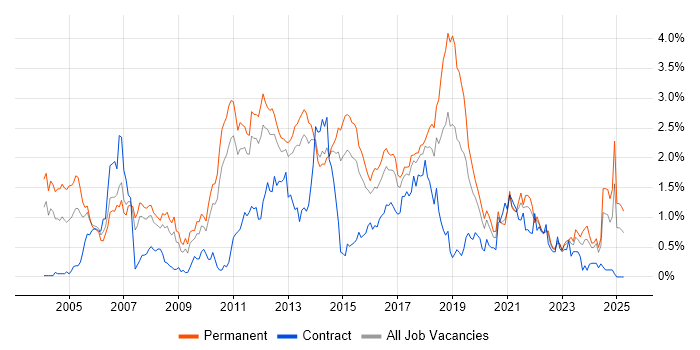Enterprise Application Software
West Yorkshire > Leeds
The table below looks at the prevalence of the term Enterprise Software in permanent job vacancies in Leeds. Included is a benchmarking guide to the salaries offered in vacancies that cited Enterprise Software over the 6 months leading up to 5 February 2026, comparing them to the same period in the previous two years.
| 6 months to 5 Feb 2026 |
Same period 2025 | Same period 2024 | |
|---|---|---|---|
| Rank | 73 | 70 | 105 |
| Rank change year-on-year | -3 | +35 | +55 |
| Permanent jobs citing Enterprise Software | 39 | 17 | 16 |
| As % of all permanent jobs in Leeds | 2.61% | 1.80% | 0.94% |
| As % of the Miscellaneous category | 9.09% | 5.25% | 2.81% |
| Number of salaries quoted | 31 | 3 | 13 |
| 10th Percentile | £46,446 | £43,500 | £51,250 |
| 25th Percentile | £70,000 | £54,375 | £56,250 |
| Median annual salary (50th Percentile) | £75,000 | £75,000 | £62,783 |
| Median % change year-on-year | - | +19.46% | -1.95% |
| 75th Percentile | - | £78,750 | £80,000 |
| 90th Percentile | £97,500 | £79,500 | £84,000 |
| West Yorkshire median annual salary | £75,000 | £50,000 | £61,641 |
| % change year-on-year | +50.00% | -18.89% | -3.73% |
All Generic Skills
Leeds
Enterprise Software falls under the General and Transferable Skills category. For comparison with the information above, the following table provides summary statistics for all permanent job vacancies requiring generic IT skills in Leeds.
| Permanent vacancies with a requirement for generic IT skills | 429 | 324 | 569 |
| As % of all permanent jobs advertised in Leeds | 28.73% | 34.21% | 33.29% |
| Number of salaries quoted | 262 | 149 | 421 |
| 10th Percentile | £29,075 | £25,950 | £31,250 |
| 25th Percentile | £45,000 | £45,000 | £42,250 |
| Median annual salary (50th Percentile) | £60,000 | £52,500 | £60,000 |
| Median % change year-on-year | +14.29% | -12.50% | -1.78% |
| 75th Percentile | £77,500 | £73,886 | £77,500 |
| 90th Percentile | £100,000 | £98,474 | £91,934 |
| West Yorkshire median annual salary | £60,000 | £54,000 | £57,500 |
| % change year-on-year | +11.11% | -6.09% | -4.17% |
Enterprise Software
Job Vacancy Trend in Leeds
Historical trend showing the proportion of permanent IT job postings citing Enterprise Software relative to all permanent IT jobs advertised in Leeds.

Enterprise Software
Salary Trend in Leeds
Salary distribution trend for jobs in Leeds citing Enterprise Software.

Enterprise Software
Salary Histogram in Leeds
Salary distribution for jobs citing Enterprise Software in Leeds over the 6 months to 5 February 2026.
Enterprise Software
Co-Occurring Skills & Capabilities in Leeds by Category
The following tables expand on the one above by listing co-occurrences grouped by category. They cover the same employment type, locality and period, with up to 20 co-occurrences shown in each category:
